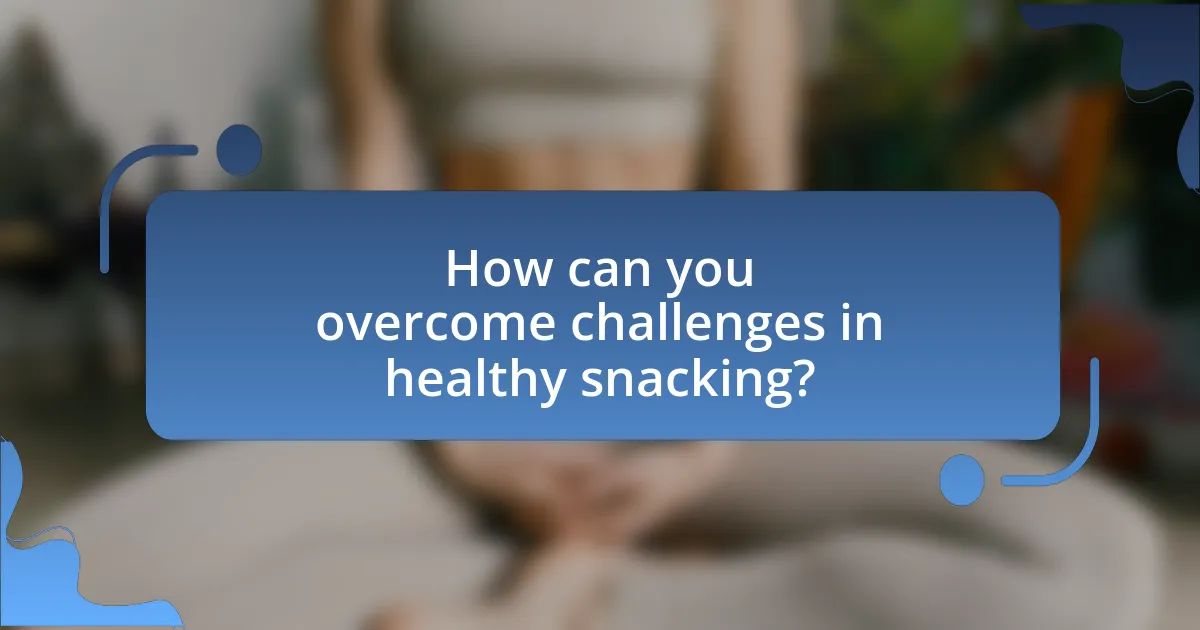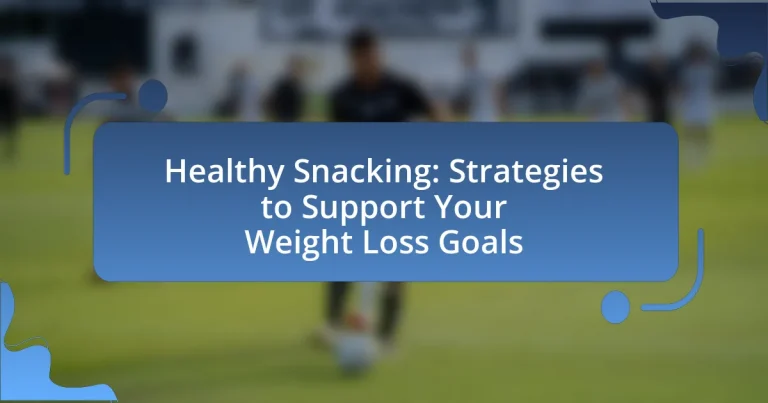Healthy snacking is the practice of consuming nutrient-dense foods in moderation between meals to enhance overall health and support weight management. This article explores how healthy snacks, rich in vitamins, minerals, fiber, and healthy fats, can aid in weight loss by regulating hunger and preventing overeating. It discusses the nutritional components of effective snacks, the impact of portion sizes on calorie intake, and strategies for incorporating healthy snacking into daily routines. Additionally, it addresses common challenges faced when trying to snack healthily and offers practical tips for overcoming these obstacles, ultimately promoting better dietary habits and improved health outcomes.

What is Healthy Snacking?
Healthy snacking refers to the practice of consuming nutrient-dense foods in moderation between meals to support overall health and weight management. This approach emphasizes snacks that are rich in vitamins, minerals, fiber, and healthy fats, such as fruits, vegetables, nuts, and whole grains, rather than high-calorie, low-nutrient options like sugary snacks or processed foods. Research indicates that incorporating healthy snacks can help regulate hunger, stabilize blood sugar levels, and prevent overeating during main meals, thereby aiding in weight loss efforts.
How does healthy snacking contribute to weight loss?
Healthy snacking contributes to weight loss by providing nutrient-dense options that help control hunger and reduce overall calorie intake. When individuals choose healthy snacks, such as fruits, vegetables, or nuts, they are more likely to feel satisfied between meals, which can prevent overeating during main meals. Research indicates that incorporating healthy snacks can lead to better weight management; for instance, a study published in the Journal of Nutrition found that participants who consumed healthy snacks experienced improved satiety and reduced calorie consumption later in the day. This approach not only supports weight loss but also promotes a balanced diet rich in essential nutrients.
What are the nutritional components of healthy snacks?
Healthy snacks typically contain a balance of macronutrients and micronutrients essential for overall health. These components include proteins, healthy fats, carbohydrates, vitamins, and minerals. For instance, snacks like nuts provide healthy fats and protein, while fruits offer carbohydrates along with vitamins and minerals. Research indicates that incorporating a variety of these nutritional components can enhance satiety and support weight management, as evidenced by studies showing that high-protein snacks can reduce hunger and promote fullness (Leidy et al., 2015, Journal of Nutrition).
How do portion sizes affect weight loss during snacking?
Portion sizes significantly affect weight loss during snacking by influencing overall calorie intake. Research indicates that larger portion sizes lead to increased consumption, which can hinder weight loss efforts. For instance, a study published in the American Journal of Clinical Nutrition found that participants who were given larger snack portions consumed 50% more calories than those with smaller portions, demonstrating a direct correlation between portion size and caloric intake. Therefore, managing portion sizes is crucial for effective weight loss during snacking.
Why is healthy snacking important for overall health?
Healthy snacking is important for overall health because it helps maintain energy levels, supports nutrient intake, and can prevent overeating during main meals. Consuming nutrient-dense snacks, such as fruits, vegetables, nuts, and whole grains, provides essential vitamins and minerals that contribute to bodily functions and overall well-being. Research indicates that individuals who incorporate healthy snacks into their diets are more likely to meet their daily nutritional requirements, which can lead to improved health outcomes, including better weight management and reduced risk of chronic diseases.
What role do snacks play in maintaining energy levels?
Snacks play a crucial role in maintaining energy levels by providing a quick source of nutrients and calories that can help sustain physical and mental performance throughout the day. When consumed between meals, snacks can prevent energy dips and help regulate blood sugar levels, which is essential for maintaining consistent energy. Research indicates that incorporating healthy snacks, such as fruits, nuts, or yogurt, can enhance overall energy and productivity, as they supply essential vitamins, minerals, and macronutrients that support metabolic functions. For instance, a study published in the Journal of Nutrition found that individuals who consumed balanced snacks experienced improved energy levels and cognitive function compared to those who did not snack.
How can healthy snacks prevent overeating at meals?
Healthy snacks can prevent overeating at meals by curbing hunger and stabilizing blood sugar levels. When individuals consume nutritious snacks, such as fruits, vegetables, or nuts, they provide essential nutrients and fiber that promote satiety. Research indicates that eating a small, healthy snack before a meal can reduce overall calorie intake by approximately 100-200 calories, as it helps to manage appetite and prevent excessive hunger during mealtime. This approach supports weight loss goals by encouraging mindful eating and reducing the likelihood of binge eating.

What strategies can support healthy snacking?
Strategies that can support healthy snacking include planning and portion control. Planning involves preparing healthy snacks in advance, such as fruits, vegetables, or nuts, which helps avoid impulsive choices that are often unhealthy. Portion control ensures that snack sizes are appropriate, preventing overeating; for instance, using small containers can help manage serving sizes effectively. Research indicates that individuals who plan their meals and snacks are more likely to make healthier food choices, thereby supporting weight loss goals.
How can meal planning enhance healthy snacking habits?
Meal planning enhances healthy snacking habits by providing structure and intentionality in food choices. When individuals plan their meals, they can incorporate nutritious snacks that align with their dietary goals, reducing the likelihood of impulsive, unhealthy snacking. Research indicates that meal planning is associated with better dietary quality and lower body mass index, as it encourages the selection of whole foods and balanced portions. By preparing snacks in advance, individuals are more likely to choose fruits, vegetables, and whole grains over processed options, thus supporting their weight loss goals effectively.
What are effective ways to prepare healthy snacks in advance?
Effective ways to prepare healthy snacks in advance include batch cooking, portioning, and using storage containers. Batch cooking allows individuals to prepare large quantities of healthy snacks, such as roasted vegetables or energy balls, which can be stored for later use. Portioning snacks into single-serving containers helps control serving sizes and makes it easier to grab a healthy option on the go. Utilizing airtight storage containers preserves freshness and prevents spoilage, ensuring that snacks remain nutritious and appealing. Research indicates that meal prepping can lead to healthier eating habits and better weight management, as it reduces the likelihood of choosing unhealthy options when hunger strikes.
How can grocery shopping be optimized for healthy snacking?
Grocery shopping can be optimized for healthy snacking by creating a detailed shopping list focused on nutritious options and avoiding processed foods. This approach ensures that only healthy snacks, such as fruits, vegetables, nuts, and whole grains, are purchased, which aligns with dietary guidelines recommending increased consumption of these food groups for better health outcomes. Research indicates that planning meals and snacks in advance can lead to healthier food choices and reduced impulse buying, ultimately supporting weight loss goals.
What types of snacks are best for weight loss?
Snacks that are best for weight loss include high-protein options, fiber-rich foods, and low-calorie choices. High-protein snacks, such as Greek yogurt or cottage cheese, help increase satiety and reduce overall calorie intake. Fiber-rich snacks like fruits, vegetables, and whole grains promote fullness and aid digestion, making it easier to manage weight. Low-calorie snacks, such as air-popped popcorn or raw veggies with hummus, provide volume without excessive calories, supporting weight loss efforts. Research indicates that incorporating these types of snacks can lead to better weight management outcomes, as they help control hunger and reduce the likelihood of overeating during meals.
Which snacks are high in protein and low in calories?
Snacks that are high in protein and low in calories include Greek yogurt, cottage cheese, hard-boiled eggs, edamame, and turkey slices. Greek yogurt typically contains around 10 grams of protein per 100 grams and is low in calories, making it an excellent choice for a protein-rich snack. Cottage cheese offers about 11 grams of protein per 100 grams with a low calorie count. Hard-boiled eggs provide approximately 6 grams of protein each while being low in calories. Edamame, with around 11 grams of protein per 100 grams, is also a nutritious option. Lastly, turkey slices are high in protein, averaging 29 grams per 100 grams, and are low in calories, making them a suitable snack for weight loss.
What are some examples of fiber-rich snacks?
Examples of fiber-rich snacks include almonds, chia seeds, and popcorn. Almonds contain about 3.5 grams of fiber per ounce, while chia seeds provide approximately 10 grams of fiber per ounce. Popcorn, when air-popped, offers around 3.5 grams of fiber per three-cup serving. These snacks not only contribute to daily fiber intake but also promote satiety, which can aid in weight loss efforts.

How can you overcome challenges in healthy snacking?
To overcome challenges in healthy snacking, individuals can plan and prepare snacks in advance. This proactive approach helps to avoid impulsive choices that often lead to unhealthy options. Research indicates that meal prepping can significantly improve dietary habits, as it allows for better control over ingredients and portion sizes. For instance, a study published in the Journal of Nutrition Education and Behavior found that individuals who engaged in meal preparation were more likely to consume fruits and vegetables regularly. By having healthy snacks readily available, such as cut fruits, nuts, or yogurt, individuals can effectively manage cravings and maintain their weight loss goals.
What common obstacles do people face when trying to snack healthily?
People commonly face several obstacles when trying to snack healthily, including lack of time, availability of unhealthy options, and insufficient knowledge about nutritious choices. Lack of time often leads individuals to opt for quick, processed snacks that are high in sugar and unhealthy fats. Availability of unhealthy options, such as vending machines stocked with junk food, makes it challenging to choose healthier alternatives. Additionally, insufficient knowledge about what constitutes a healthy snack can result in poor choices, as many individuals may not recognize the nutritional value of fruits, vegetables, or whole grains compared to processed snacks.
How can cravings be managed effectively?
Cravings can be managed effectively through strategies such as mindful eating, regular meal planning, and incorporating healthy snacks. Mindful eating involves paying attention to hunger cues and savoring each bite, which can reduce the likelihood of impulsive eating. Regular meal planning helps maintain balanced nutrition and prevents hunger-driven cravings by ensuring that healthy options are readily available. Additionally, incorporating healthy snacks, such as fruits, vegetables, or nuts, can satisfy cravings without derailing weight loss goals. Research indicates that individuals who plan their meals and include nutritious snacks are more successful in managing cravings and achieving weight loss objectives.
What strategies can help resist unhealthy snack options?
To resist unhealthy snack options, individuals can implement strategies such as planning meals and snacks in advance, keeping healthy snacks readily available, and practicing mindful eating. Planning meals helps to reduce impulsive snacking by ensuring that nutritious options are prepared and accessible. Keeping healthy snacks, like fruits, nuts, or yogurt, within reach can deter the temptation to choose unhealthy alternatives. Mindful eating encourages awareness of hunger cues and promotes a slower eating pace, which can lead to better food choices and satisfaction. Research indicates that individuals who engage in meal planning and mindful eating are more successful in maintaining healthy eating habits and achieving weight loss goals.
What tips can enhance your healthy snacking experience?
To enhance your healthy snacking experience, focus on portion control by pre-portioning snacks into small containers or bags. This method prevents overeating and helps maintain a balanced intake of calories. Research indicates that individuals who use portion control strategies are more successful in managing their weight, as it encourages mindful eating and reduces the likelihood of consuming excessive amounts of high-calorie snacks. Additionally, incorporating a variety of nutrient-dense foods, such as fruits, vegetables, nuts, and whole grains, can improve satiety and provide essential vitamins and minerals, further supporting weight loss goals.
How can mindfulness improve your snacking choices?
Mindfulness can improve snacking choices by enhancing awareness of hunger cues and food preferences. When individuals practice mindfulness, they become more attuned to their body’s signals, allowing them to differentiate between physical hunger and emotional cravings. Research indicates that mindfulness can lead to healthier eating behaviors; for instance, a study published in the journal “Appetite” found that participants who engaged in mindfulness practices made more nutritious food choices and consumed fewer calories. This heightened awareness helps individuals select snacks that align with their health goals, ultimately supporting weight loss efforts.
What are some quick and easy healthy snack recipes?
Quick and easy healthy snack recipes include Greek yogurt with honey and berries, apple slices with almond butter, and carrot sticks with hummus. Greek yogurt provides protein and probiotics, while honey and berries add natural sweetness and antioxidants. Apple slices with almond butter offer fiber and healthy fats, making them a satisfying choice. Carrot sticks paired with hummus deliver vitamins and minerals along with plant-based protein. These snacks are not only nutritious but also simple to prepare, supporting weight loss goals effectively.


